
Cholera is an infection of the small intestine by some strains of the bacterium Vibrio cholerae. Symptoms may range from none, to mild, to severe. The classic symptom is large amounts of watery diarrhea lasting a few days. Vomiting and muscle cramps may also occur. Diarrhea can be so severe that it leads within hours to severe dehydration and electrolyte imbalance. This may result in sunken eyes, cold skin, decreased skin elasticity, and wrinkling of the hands and feet. Dehydration can cause the skin to turn bluish. Symptoms start two hours to five days after exposure.

Neuroscience is the scientific study of the nervous system, its functions and disorders. It is a multidisciplinary science that combines physiology, anatomy, molecular biology, developmental biology, cytology, psychology, physics, computer science, chemistry, medicine, statistics, and mathematical modeling to understand the fundamental and emergent properties of neurons, glia and neural circuits. The understanding of the biological basis of learning, memory, behavior, perception, and consciousness has been described by Eric Kandel as the "epic challenge" of the biological sciences.

The Nobel Prize in Physiology or Medicine is awarded yearly by the Nobel Assembly at the Karolinska Institute for outstanding discoveries in physiology or medicine. The Nobel Prize is not a single prize, but five separate prizes that, according to Alfred Nobel's 1895 will, are awarded "to those who, during the preceding year, have conferred the greatest benefit to humankind". Nobel Prizes are awarded in the fields of Physics, Medicine or Physiology, Chemistry, Literature, Economics and Peace.

Barry James Marshall is an Australian physician, Nobel Laureate in Physiology or Medicine, Professor of Clinical Microbiology and Co-Director of the Marshall Centre at the University of Western Australia. Marshall and Robin Warren showed that the bacterium Helicobacter pylori plays a major role in causing many peptic ulcers, challenging decades of medical doctrine holding that ulcers were caused primarily by stress, spicy foods, and too much acid. This discovery has allowed for a breakthrough in understanding a causative link between Helicobacter pylori infection and stomach cancer.

Otto Fritz Meyerhof was a German physician and biochemist who won the 1922 Nobel Prize in Physiology and Medicine.
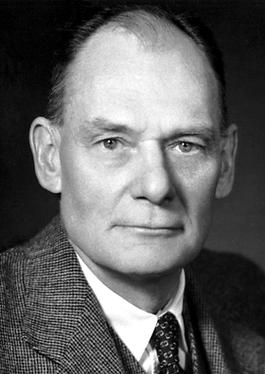
John Franklin Enders was an American biomedical scientist and Nobel Laureate. Enders has been called "The Father of Modern Vaccines."
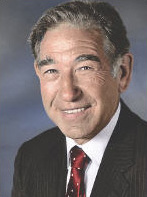
Stanley Cohen was an American biochemist who, along with Rita Levi-Montalcini, was awarded the Nobel Prize in Physiology or Medicine in 1986 for the isolation of nerve growth factor and the discovery of epidermal growth factor. He died in February 2020 at the age of 97.
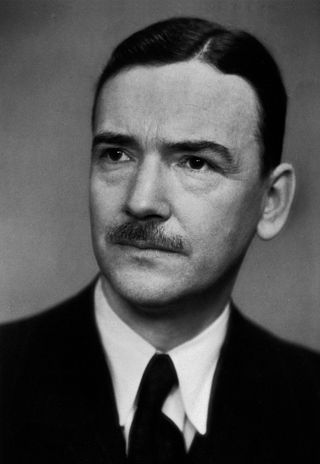
Ulf Svante von Euler was a Swedish physiologist and pharmacologist. He shared the Nobel Prize in Physiology or Medicine in 1970 for his work on neurotransmitters.

Daniel Nathans was an American microbiologist. He shared the 1978 Nobel Prize in Physiology or Medicine for the discovery of restriction enzymes and their application in restriction mapping.
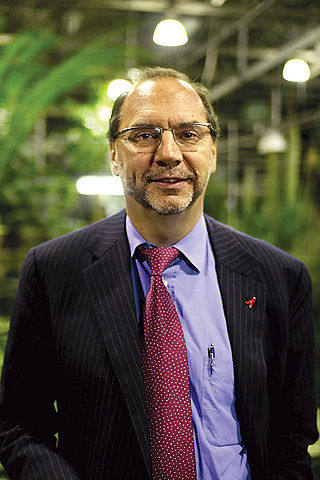
Sir Peter Karel, Baron Piot, is a Belgian-British microbiologist known for his research into Ebola and AIDS.
Derek Summerfield is an honorary senior lecturer at London's Institute of Psychiatry and a member of the Executive Committee of Transcultural Special Interest Group at the Royal College of Psychiatry. He is also an Honorary Fellow of the Egyptian Psychiatric Association. He has published around 150 papers and has made other contributions in medical and social sciences literature.

Ralph Marvin Steinman was a Canadian-American physician and medical researcher at Rockefeller University, who in 1973 discovered and named dendritic cells while working as a postdoctoral fellow in the laboratory of Zanvil A. Cohn, also at Rockefeller University. Steinman was one of the recipients of the 2011 Nobel Prize in Physiology or Medicine.

Substance use disorder (SUD) is the persistent use of drugs despite the substantial harm and adverse consequences to one's own self and others, as a result of their use. In perspective, the effects of the wrong use of substances that are capable of causing harm to the user or others, have been extensively described in different studies using a variety of terms such as substance use problems, problematic drugs or alcohol use, and substance use disorder. The National Institute of Mental Health (NIMH) states that "Substance use disorder (SUD) is a treatable mental disorder that affects a person's brain and behavior, leading to their inability to control their use of substances like legal or illegal drugs, alcohol, or medications. Symptoms can be moderate to severe, with addiction being the most severe form of SUD". Substance use disorders (SUD) are considered to be a serious mental illness that fluctuates with the age that symptoms first start appearing in an individual, the time during which it exists and the type of substance that is used. It is not uncommon for those who have SUD to also have other mental health disorders. Substance use disorders are characterized by an array of mental/emotional, physical, and behavioral problems such as chronic guilt; an inability to reduce or stop consuming the substance(s) despite repeated attempts; operating vehicles while intoxicated; and physiological withdrawal symptoms. Drug classes that are commonly involved in SUD include: alcohol (alcoholism); cannabis; opioids; stimulants such as nicotine, cocaine and amphetamines; benzodiazepines; barbiturates; and other substances.
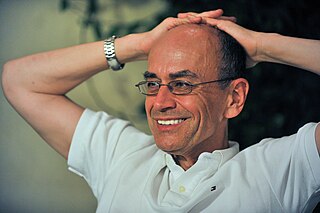
Thomas Christian Südhof, ForMemRS, is a German-American biochemist known for his study of synaptic transmission. Currently, he is a professor in the school of medicine in the department of molecular and cellular physiology, and by courtesy in neurology, and in psychiatry and behavioral sciences at Stanford University.

Sir Michael Houghton is a British scientist and Nobel Prize laureate. Along with Qui-Lim Choo, George Kuo and Daniel W. Bradley, he co-discovered Hepatitis C in 1989. He also co-discovered the Hepatitis D genome in 1986. The discovery of the Hepatitis C virus (HCV) led to the rapid development of diagnostic reagents to detect HCV in blood supplies, which has reduced the risk of acquiring HCV through blood transfusion from one in three to about one in two million. It is estimated that antibody testing has prevented at least 40,000 new infections per year in the US alone and many more worldwide.

Khalida Ismail is Professor of Psychiatry and Medicine at the Institute of Psychiatry, King's College London, specializing in diabetes and mental health. Ismail is an Honorary Consultant Liaison Psychiatrist at King's College Hospital NHS Foundation Trust.

Rohingya refugees in Bangladesh mostly refer to forcibly displaced Myanmar nationals from Myanmar who are living in Bangladesh. The Rohingya people have experienced ethnic and religious persecution in Myanmar for decades. Hundreds of thousands have fled to other countries in Southeast Asia, including Malaysia, Indonesia, and Philippines. The majority have escaped to Bangladesh, where there are two official, registered refugee camps. Recently violence in Myanmar has escalated, so the number of refugees in Bangladesh has increased rapidly. According to the UN Refugee Agency (UNHCR), more than 723,000 Rohingya have fled to Bangladesh since 25 August 2017.

Michael Joseph Ryan is an Irish epidemiologist and former trauma surgeon, specialising in infectious disease and public health. He is executive director of the World Health Organization's Health Emergencies Programme, leading the team responsible for the international containment and treatment of COVID-19. Ryan has held leadership positions and has worked on various outbreak response teams in the field to eradicate the spread of diseases including bacillary dysentery, cholera, Crimean–Congo hemorrhagic fever, Ebola, Marburg virus disease, measles, meningitis, relapsing fever, Rift Valley fever, SARS, and Shigellosis.

The Vaccine Confidence Project (VCP) founded in 2010 by Heidi Larson, was developed in response to hesitancy and misinformation on vaccination programmes such as those that caused a boycott of polio eradication efforts in Northern Nigeria in 2003–04. It is an early warning system to identify and evaluate public confidence in vaccines, with the purpose of tackling the problem early, when it is likely to be manageable.

The MRC Weatherall Institute of Molecular Medicine at the University of Oxford is a research institute located at the John Radcliffe Hospital in Oxford. Founded in 1989 by Sir David Weatherall, the institute focuses on furthering our understanding of clinical medicine at a molecular level. It was one of the first institutes of its kind in the world to be dedicated to research in this area.




















